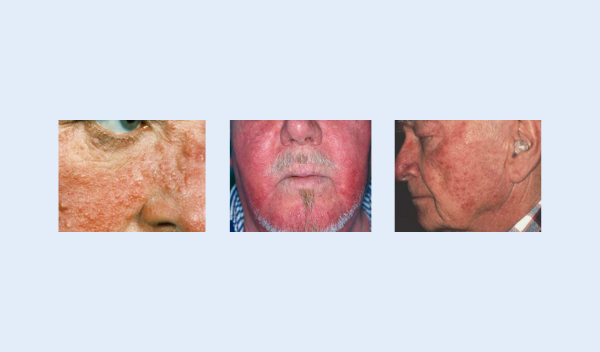Everything You Need to Know About Rosacea for ABIM Boards

A man presents with this facial rash, which has been chronic for years, and a history of flushing that worsens with alcohol intake. What is the diagnosis?
.png?width=400&name=skin%20signs%20post%20%20(1).png) A man presents with rosacea
A man presents with rosacea
Rosacea is a relapsing and remitting lifelong condition that primarily affects fair-skinned, middle-aged patients and presents with erythema, phymas, telangiectasias, papules, and pustules (acne-like lesions) on the central face. It occurs more frequently in women but is more severe in men.
Disease begins with intermittent flushing, often precipitated by spicy foods and alcohol. Eventually, the skin takes on a persistent flush with later development of papules (PAPS1, PAPS2, PAPS3), pustules (PUS1, PUS2), and telangiectasias (TEL1, TEL2, TEL3). These clinical lesions can progress to deeper, more intense nodular lesions with skin thickening. Rhinophyma, more common in men, is an enlargement of the nose that can occur with long-standing rosacea.
Differentiate rosacea from acne by the absence of comedones.
Diagnosis: Clinical.
Treatment: Sunscreen, moisturizers, gentle cleansers, and avoidance of the patient-specific triggers for flushing (e.g., sun, spicy foods, alcoholic beverages, exercise, embarrassment). Light-based treatment helps the telangiectasias, when severe. Topical metronidazole, or oral tetracycline, is useful for papulopustular disease.
Phymatous rosacea is difficult to treat; very advanced disease can be treated with surgery or laser ablation.
This information comes from our 19th Edition Internal Medicine Core, which includes all of the IM knowledge you need in an easier to comprehend way. It will help you retain the info longer and improve your recall of it! Start a free trial now.


